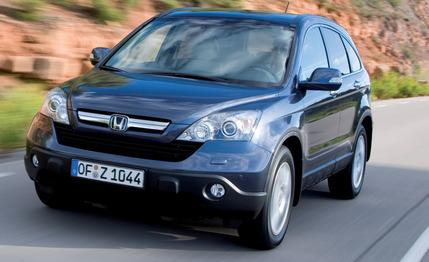 Short Take Road Test
Short Take Road Test

When you’re talking trucks, diesel power trumps all. With their mountainous torque, diesels put up huge numbers for towing, and the engines also deliver (relatively) small fuel-consumption figures and—in a more recent development—low emissions. But what about compact trucks? Is a diesel the same feel-good pill in a unibody car-based trucklet?
Hey, Don’t I Know You?
To find out, we called up the diesel wizards at Bosch and borrowed a German-market Honda CR-V oil burner from their fleet. This is the same 2.2-liter four-cylinder turbo-diesel we tested in a Euro-market Honda Accord in August 2008, with 138 hp and 251 lb-ft of torque. That’s 28 fewer hp but 90 more lb-ft than the gas CR-V we get here, twisting through a six-speed manual in our tester.

Although the Accord seemed compromised by the diesel and its relative lack of zest, the engine is a more natural fit in the CR-V; few people expect rocket power in their small SUVs. Indeed, the diesel CR-V’s 9.4-second 0-to-60 huff would have placed it second to last in our most recent compact-SUV comparo, but it is within one second of all but the two fastest competitors and only 0.3 second behind the test average and the gas-powered CR-V. And once its turbo spun up, the diesel CR-V’s 17.0-second quarter-mile run at 80 mph would have landed it firmly midpack, 0.1 second ahead of its gas sibling, which also happens to weigh over 200 fewer pounds than the oil burner. Our observed fuel economy of 28 mpg, on the other hand, exceeds the comparo average by 47 percent. For comparison, our highest recorded average for a gas-fueled CR-V is 22 mpg.
Honda-High Redline—for a Diesel
This small diesel is at its most impressive at high rpm, where it pulls hard even past the indicated 4500-rpm redline, all the way to the 5000-rpm fuel cutoff without a hint of the high-rpm drop in power historically associated with diesels and still exhibited by many modern oil burners. The turbo is slow to spool up, though, taking what feels like two or more seconds to wind up to full power. Thankfully, the six-speed manual wouldn’t feel too out of place in a Honda S2000, and its slick action facilitates quick shifts that keep the turbo on the boil. Once the boost spools up, back-road passes are quick, and the torquey four doesn’t seem to care much what gear it’s in.
But the amount of noise produced by this engine makes it feel relatively unrefined, and it’s way louder inside at idle than a gas-fired CR-V (51 dB versus 39 dB). A VW Jetta TDI’s diesel engine is similar in size and output but quiet enough to mask its sparkless roots. The CR-V, on the other hand, clatters so much that drivers might think they were sitting seven feet off the ground with a sleeper berth behind them. Personally, we like the small diesel clatter, because we like to know we’re driving something a little different, but we see how some might find it off-putting. As for the usual towing benefit of a diesel, the oil-burning CR-V is rated in Europe to handle 4400 pounds, an additional 1100 compared with the equivalent gas-powered version.
No Plans to Bring it Stateside
A price increase of between six and seven percent (depending on country) in Europe translates to about $1500 more in the U.S., a difference that would take about 50,000 miles to make up at current fuel prices. But that’s a palatable premium to us; we find the torque rush addicting. Besides, there’s nothing wrong with getting better mileage (as long as you don’t hypermile to do it; that stuff is just wrong).
However, given the current volatile fuel market, those 50,000 miles could become 75,000 or 80,000 tomorrow. Besides, the various ways gasoline and diesel vehicles are taxed throughout Europe means that the pricing difference could be much greater in the U.S., and although the vehicle seen here meets current European emissions regulations, it does not meet the U.S.’s stricter set of rules. Cleaning it up even more would further compound any price difference. Not that it matters, as there is no diesel CR-V headed across the pond any time soon, and Honda’s plans to bring any diesels to the U.S. are currently on hold while the company expands its hybrid lineup.